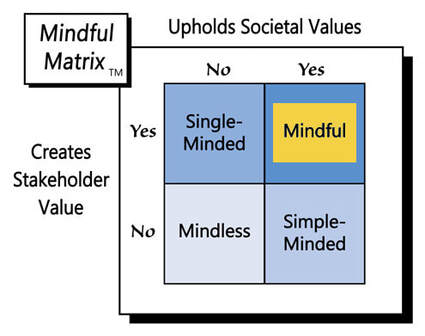author of Honorable Influence - founder of Mindful Marketing
Among those with a keen interest in the current social climate are marketers. At a minimum, they want to demonstrate that their organizations are in step with public sentiment. Even better, they’d like to suggest they’re leading the charge for positive societal change.
Over recent years, we’ve witnessed dozens of companies advertise their support for causes that have included immigration reform, gender equality, and racial justice. Even with a change in the Oval Office, the social unrest that fueled these and other movements is likely to continue, in part because America is so ideologically divided.
Despite the state of the nation, only half of marketers have specific plans that account for such social unrest. Furthermore, those with strategies may be working from flawed assumptions, at least if they’re following examples like that of Gap.
The clothing company recently tweeted its wide-eyed desire for red and blue voters to “come together.” It quickly deleted the tweet, however, after considerable backlash accused the firm of “tone-deafness and words that were not backed up by action.”
As Pepsi’s failed ‘protest’ commercial featuring Kendall Jenner showed, consumers don’t like when companies just pay lip service to social concerns. People want firms to act on their supposed convictions and walk the walk, not just talk the talk.
The question, then, is: How marketers, whether they’re individuals or organizations, move beyond words to unifying actions? Here are six suggestions:
1. Separate individuals from issues: Some people have a hard time putting a partition between the things others say and those who say them. As a result, disagreements over issues often descend into personal attacks that undermine unity, e.g., “Well, if you believe that, you’re an idiot.”
If it’s hard to coexist on social media with someone whose opinions are very different than your own, imagine being married to that person. That’s exactly the union that liberal-leaning James Carville and conservatively-inclined Mary Matalin represent. Despite very strong ideological differences, the famous pair of political consultants have a long and happy marriage because they love and respect the other person. Issues are not the individual.
2. Genuinely listen: Anyone who argues that listening isn’t a real action probably hasn’t done much serious listening. It takes patience and focus to listen well, and even greater skill to effectively communicate to others that you’ve heard and understood them.
To its credit, Pepsi recognized its error with the Jenner ad and has made “social listening” a top priority. According to vice president of marketing Todd Kaplan, the company now actively identifies and seeks to understand specific “cultural truths,” which determine the brand, not vice versa. The company has made careful listening a prerequisite for action.
3. Find common ground: When confronted with controversy, too often people run to their ideological corners, from which they launch long-range attacks on their adversaries—an approach that is alienating, to say the least. On the other hand, when people first identify points of agreement, communication tends to unfold much more favorably for all.
In sales, one of the most difficult things is to ‘cold call’ prospective clients—"I don’t know you, you don’t know me, but here I am.” However, it’s amazing how quickly the temperature of such interactions warms when the salesperson and prospect come across someone/something they have in common, e.g., a shared acquaintance, the place they grew up, a favorite sports team, etc. Shared affinities and experiences, as well as beliefs, lay a foundation for mutual respect.
4. Show humility: There’s little more socially off-putting than unabashed arrogance—individuals who are very ‘full of themselves,' often insisting they’re right, and suggesting they can do no wrong. Such an “I’m above you” attitude implies an uncomfortable hierarchy that undercuts unity.
In contrast, there are others who are brilliant, talented, experts in their fields, yet readily admit that they don’t have all the answers and acknowledge that they sometimes make mistakes. Despite the greater gulf that probably exists between us and them, it’s this latter group that makes us feel more valued and welcomed.
5. Practice hospitality: We forget the vast majority of things that people say to us, but we tend to remember for a long time even the small acts of kindness that people do for us. It’s been more than 20 years, but I still remember when, shortly after the birth of our son, my department chair stopped by our home to visit and drop off a meal that his wife had made for us.
I’ve also been a grateful recipient of notes of encouragement, such as one I received recently from a student who wanted to express thanks for the special efforts faculty members have made to teach during the pandemic. Great or small, such hospitable acts bring people together, physically, figuratively, or both.
6. Laugh: If you notice a couple that never laughs, it’s likely a relationship on the rocks. People who are on good terms, tend to joke with each other. In fact, even more than a sign of healthy relationships, laughing together helps build social bonds.
Two colleagues and I recently conducted a study that looked at “playful teasing” in television commercials. Among other results, we found high means for ‘liking’ and ‘recall’ of ads that contained friendly joking, even when the ribbing crossed racial lines.
Saying the right words and avoiding the wrong ones is important for many persuasive purposes; however, if words were what motivated most, there wouldn’t be so many sayings like these:
- Actions speak louder than words.
- I’ll believe it when I see it.
- Don’t just tell me, show me.
- Talk is cheap.
- Don’t trust words, trust actions.
- You are what you do, not what you say.
- Well done is better than well said.
- Pay less attention to what people say. Just watch what they do.
- Words are from the lips; actions are from the heart.
- A promise is a cloud; fulfillment is rain.
Marketing is about bringing people with related needs together for mutually beneficial exchange. Whether those exchanges happen for economic reasons or other reasons, each exchange encourages participants to bond, but only if the marketer models unity.
More specifically, marketing communication must rest on a foundation of supportive action, such as the six suggestions listed above. Unfortunately, this article is just words, but hopefully it serves as a reminder that behaviors that build unity are among the best examples of “Mindful Marketing.”
Learn more about the Mindful Matrix.
Check out Mindful Marketing Ads and Vote your Mind!




 RSS Feed
RSS Feed